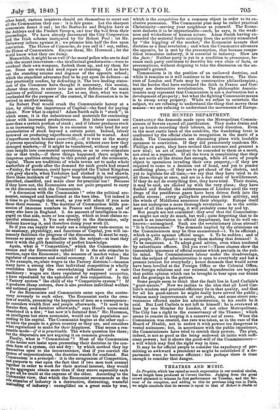THE HUNTED DEPARTMENT.
CERTAINLY the demands made upon the Metropolitan Commis- sioners of Sewers exceed all justification. They make drains and set up boards recording their labours, in every direction. Even in the most rustic lanes of the outskirts, the wandering lover is confronted by the official claim to recognition in the merit of a ditch. The Commissioners are discussing plans with laudable openness to conviction. If they did prematurely condemn Mr. Phillips ex pane, they have revised that sentence and granted a new trial; an act of candour to be conceded to them as a merit, not cited as a reproach. If all the town is complaining that they do not settle all the drains fast enough, while all sorts of people object to operations invading their own property,—if they are required to come to a decision out of hand, and yet to ponder conflicting plans,—if they are to get ahead of the cholera, and yet to legislate for all time —we say that they have tried to do all those things at once, and are in a due state of bewilderment. If they do not do everything first, they have tried. Their drains, it may be said, are choked up with the very plans; they have flushed and flooded the subterraneans of London until the very dregs of the pestiferous gases have been driven forth into the public streets ; every gulleyhole proclaims their activity, and the winds of Middlesex announce their ubiquity. Europe itself has not undergone a more thorough revolution : as to the settle- ment of all this upheaving, it will probably come by and by. But people are not contented : they aver that the Commission- ers might not only do much, but well; quite forgetting that to do much is an innovation in official department, but to do well un- known—unimagined. Such are the revolutionary ideas abroad! "It is Communism." The demands implied by the criticisms on the Commissioners may be thus enumerated-1. To be efficient ; which is quite against official usage. 2. To be sudden ; and of all people, 111r. Speaker is among those making that demand! 3. To be consistent. 4. To adopt good advice even when tendered
by subordinate officers. Did you ever clauses show the lamentable ignorance of official routine which prevails in the pub- lic mind. The Commissioners labour under the disadvantage, that the subject of administration is open to everybody and has a present interest for everybody ; hence demands that would never have been levelled at the Foreign Office or the Colonial Office. Our foreign relations and our external dependencies are beyond that public opinion which can be brought to bear upon our drains and the gratings in the gutters.
Some people seem to think that the fault lies in Lord Carlisle's "good-nature." Now we incline to the idea that all Lord Car- lisle's wisdom and practical efficiency lie in that quality, and that for all his good-nature he might really have served the public ; witness many improvements of our parks, and some street con- veniences effected under his administration to his credit be it said. But Lord Carlisle is not left to himself: he is overawed at least by one Member for London, if not other Metropolitans. The City has a right to the conservancy of the Thames which seems to consist in keeping it a conserve not of roses. When the Commission was created, due care was taken, as in the case of the Board of Health, not to endow it with powers too dangerous to vested nuisances; but, in accordance with the public impatience, the Commissioners have tried to stretch their powers. The plan, indeed, is not so good as the being endowed ab initio with suffi- cient powers ; but it shows the good-will of the Commissioners— a will which may find the right way in time. It may be for official people to consider the expediency of per- mitting so awkward a precedent as might be established if a de- partment were to become efficient : but perhaps there is time enough to consider that danger.


























 Previous page
Previous page